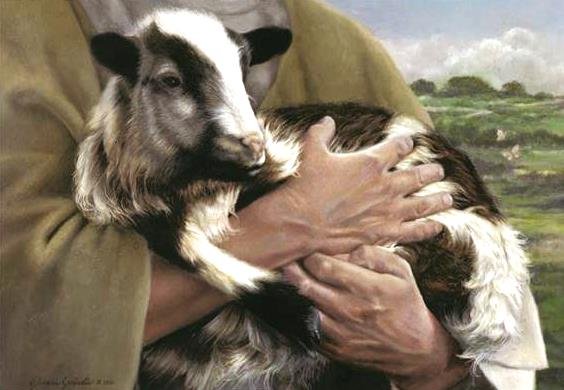Loving Shepherds, Trusting Sheep
IN Bible times the close attachment between the shepherd and his sheep was proverbial. Often the shepherd was either the owner of the sheep or a member of the owner’s family. In the morning he would go to the fold and call out his flock from among the several flocks penned there. He knew his sheep; they knew his voice. He did not drive them—he led them and they followed. To green pastures and fresh waters he guided them. In bad weather at nightfall, he either returned them to the fold or sheltered them in a cave. In mild weather, he spent the nights with them out under the stars—just as in the autumn of the year 2 B.C.E. when shepherds were “living out of doors and keeping watches in the night over their flocks.”—Luke 2:8.

If one sheep strayed, the shepherd searched until he found it. (Luke 15:4) The 99 did not satisfy him until the lost one had been restored.
The relationship of the Eastern shepherd to his flock was deeply emotional, as one of them testified: “The loss of a sheep brought sorrow to my soul. When one of them became sick or was sold, I wept because I was losing a friend whom I cared for and who cared for me. Beneath the clear and burning skies of the Bible Lands, there grows up, as it did with me, between the shepherd and his flock a union of attachment and tenderness. Alone in their solitude, with no human being near, in hours of peace or peril, the shepherd and sheep feel a life in common.”

The faithful shepherd was a fearless protector. He fought off robbers that came to steal. He routed wild animals that came for prey. And as the shepherd lad David, he was accurate to a hairbreadth with the slingstones.
David then said to Saul: “Your servant became a shepherd of his father’s flock, and a lion+ came, also a bear, and each carried off a sheep from the flock. 35 I went out after it and struck it down and rescued it from its mouth. When it rose up against me, I grabbed it by its fur* and struck it down and put it to death. 36 Your servant struck down both the lion and the bear, and this uncircumcised Phi·lisʹtine will become like one of them, for he has taunted* the battle lines of the living God.”+ 49 David thrust his hand into his bag and took a stone from there and slung it. He struck the Phi·lisʹtine in the forehead, and the stone sank into his forehead and he fell facedown on the ground.+ (1 Samuel 17:34-36, 49)
If a sheep was eaten, the shepherd sought to retrieve pieces of bone or skin to make an accounting for the lost animal. Especially was this so if the shepherd was a hireling—without such proof he might be suspected of stealing it.—Exodus 22:12-15;
The sheep trusted their shepherds. Many were given descriptive names—split ear, fat tail, black face, pure white. When the shepherd called their name, they responded. One researcher sought to verify this when he passed a flock of sheep. He relates the following:
“I then bade him [the shepherd] call one of his sheep. He did so, and it instantly left its pasturage and its companions, and ran up to the hands of the shepherd, with signs of pleasure, and with a prompt obedience which I had never before observed in any other animal. It is also true that in this country, ‘a stranger will they not follow, but will flee from him.’”
Jesus confirmed much of the foregoing when he identified himself as the Fine Shepherd of his sheeplike followers: “The sheep listen to his voice, and he calls his own sheep by name and leads them out [of the fold]. When he has got all his own out, he goes before them, and the sheep follow him, because they know his voice. A stranger they will by no means follow but will flee from him, because they do not know the voice of strangers. I am the fine shepherd, and I know my sheep and my sheep know me, just as the Father knows me and I know the Father; and I surrender my soul [my life] in behalf of the sheep.”—John 10:3-5, 14, 15.
Not only Christ Jesus but also Jehovah God is referred to as a shepherd. “Jehovah is my Shepherd,” says the psalmist. As such He as well as Jesus shows loving concern for “the sheep of his pasturage.” Of him it is written: “Like a shepherd he will shepherd his own drove. With his arm he will collect together the lambs; and in his bosom he will carry them. Those giving suck he will conduct with care.”—Psalm 23:1; 100:3; Isaiah 40:11.
But to the false shepherds who ill-treat his flock, Jehovah says: “I will deliver my sheep out of their mouth, and they will not become food for them.”—Ezekiel 34:10.
Comment removed
Wow! What a wonderful and blessed post. God bless you.